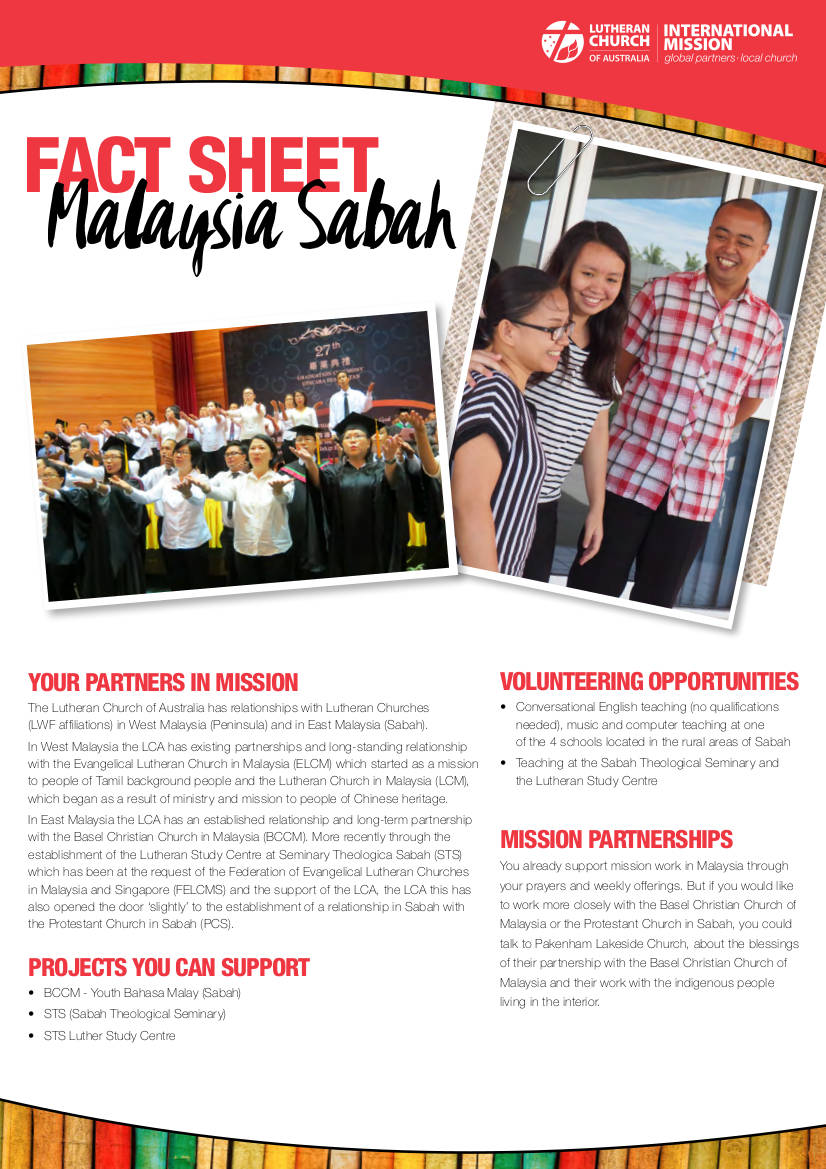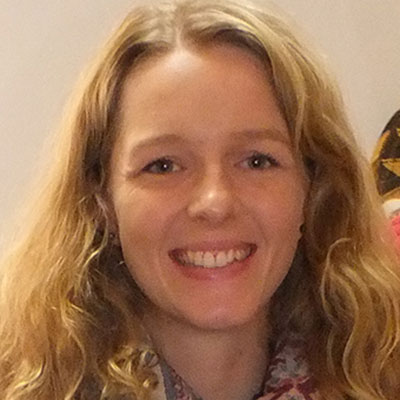International and local Lutheran mission partners
IN MALAYSIA EAST (SABAH)
Basel Christian Church of Malaysia (BCCM)
In 1882 the British North Borneo Chartered Company urgently needed workers to ‘open up’ the country. One of the organisations they approached in Hong Kong was the Basel Church, which had been established by the Basel Mission Society based in Switzerland. Around ten families took up the opportunity and emigrated to North Borneo, where they were employed as plantation workers. These pioneers were the first Basel Christians in North Borneo.
True to their beliefs, they worked for six days a week and rested on Sundays, as well as gathering for worship in one of their homes. In 1886 a impla atatp (roof of coconut leaves) church was built on the plantation. It was the first Basel church building in North Borneo. In 1901 the first school was opened; it was managed by the immigrant pastors and lay members. So, by the time North Borneo joined the Federation of Malaya (which became Malaysia in 1963), the Basel Church had already been established in North Borneo for 77 years.
The original Basel Church Christians were Chinese Hakka. Cross-cultural exposures over the years, however, encouraged church members to stretch beyond their traditional ways of doing things, and they began to focus on evangelising the indigenous people in their community. In 1976 the first chapel for indigenous Basel Christians was erected, at Kg Peniang. Since then the indigenous congregation has grown rapidly. Today the Basel Christian Church of Malaysia (BCCM) is a multi-racial and multi-cultural church.
The BCCM’s primary training institution, Sabah Theological Seminary, was established in 1988.
Protestant Church in Sabah (PCS)
Aware of the absence of evangelism among the Rungus, who were animists, the Basel Christian Church asked the Basel Missionary Society to look into the possibility of a mission to the Rungus in 1951. Hans Bienz, the sixth and the last Basel Missionary Society advisor to the Basel Christian Church, began touring Rungus villages such as Kimihang, Lajong, Handal, Angkob and Rondomon in February 1952.
He was accompanied by Huang Qianfu and a few other Basel Hakka Christians who acted as interpreters. The Basel Missionary Society then sent Henrich Honeggar to Kudat on 23 November 1952. Both Bienz and Honeggar approached the Basel Hakka teacher in Sikuati, Tang Juechen, who took them to Masangkung and, using his network and influence, invited nearby village chiefs for a meeting. This took place on 11 December 1952 in the garage of a Hakka Christian in Sikuati; 45 people from 11 villages attended and formally welcomed the Baslem Missionary Society to work among their people.
In the years following, several villages embraced Christianity. Meetings of the headmen of the tribes were organised to facilitate evangelisation. Another important factor was the training of lay people, not only teaching biblical topics but also Malay language and mathematics. The number of people receiving such training was small but grew steadily. Gradually the Momogun people, one of the Rungus tribes, began to respond to the gospel. They noticed the difference between their way of life and that of the missionaries and the converts. They saw that the Christians among them were no longer bound by the traditional fears of evil spirits and other superstitions. Many sought to embrace the new faith.
In 1965, the constitution of The Protestant Church in Sabah (PCS) was drafted by church elders and missionaries, and the formation of the PCS was officially initiated by a first synod on 20 April 1966 and registered as a legal entity by the Government of Malaysia in 1967. With the departure of the foreign missionaries in 1973, the Basel Christian Church in Malaysia came to support the young church.
By 1977, 25 years later, the Basel Missionary Society had sent 39 missionaries to work among the Rungus. The church had spread throughout the Kudat Peninsula, parts of Bengkoka and Marudu and there were more than 13,000 followers.
From 1996, the PCS began to establish local congregations in the Peninsula of West Malaysia as well as in Singapore. It has also developed relationships with sister churches in Kalimantan, the Indonesian part of the island of Borneo. Since 1995 PCS has been a member of the Lutheran World Federation.
Today, a truly indigenous church, PCS consists of many indigenous tribes such as Rungus, Tobonuvo, Kimaragang, Garo and others. PCS currently has 54,000 church members, 327 congregations, 11 parishes, 3 primary schools, 20 children learning centres/kindergartens, 1 theological school (Luther Seminary), 1 senior citizen centre, 4 hostels, 12 houses of craft for economic empowerment and 122 full time staff.







